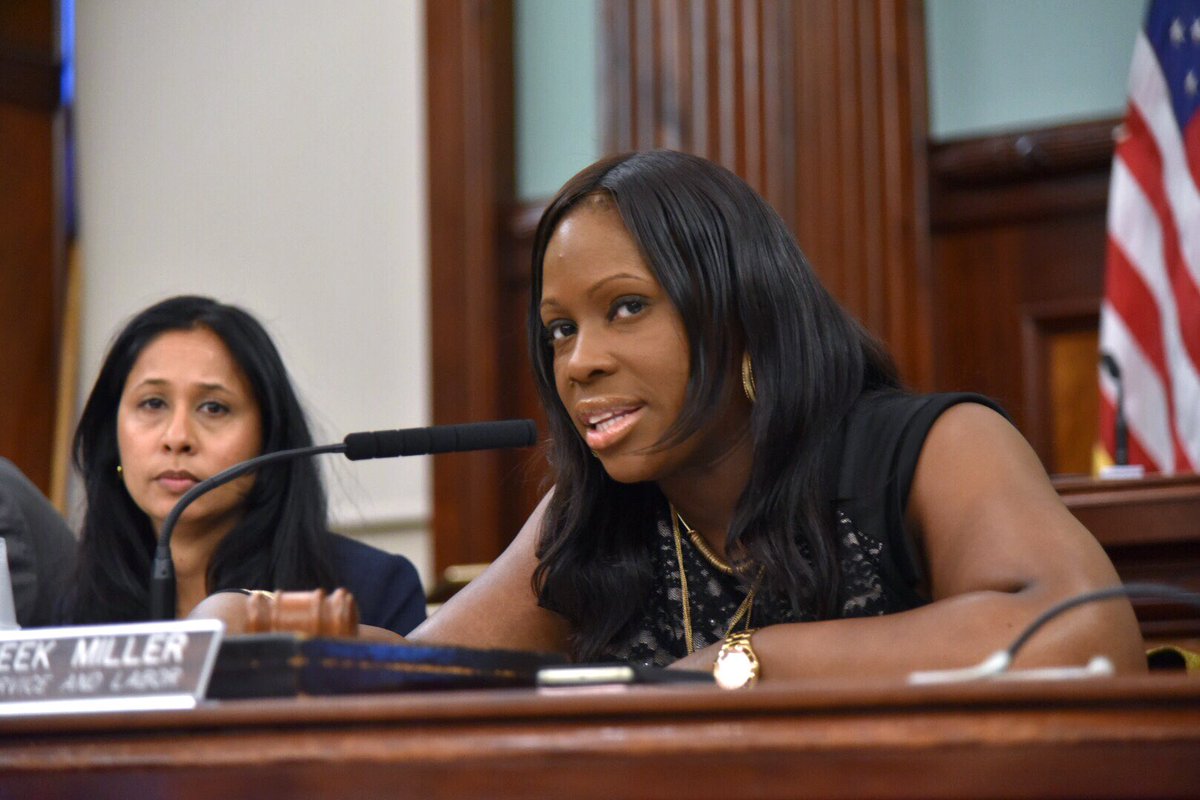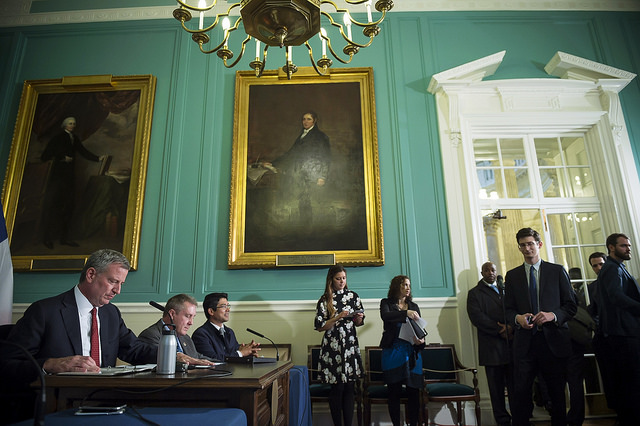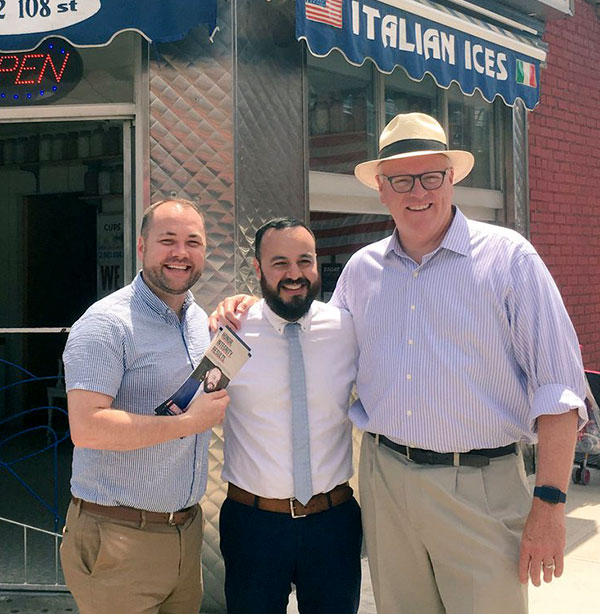New York City Now Has Its Own Legal Parameters for ‘Disorderly Conduct’

Council Member Vanessa Gibson (photo: John McCarten/City Council)
A City Council bill that creates an alternative to the state’s “disorderly conduct” statute, and mandates lower punishment for the infraction, became law on Friday along with numerous other bills relating to protecting undocumented immigrant New Yorkers. The bill, sponsored by City Council Member Vanessa Gibson, chair of the public safety committee, also adds another plank to the Council’s broad agendas of criminal justice reform and immigrant protections.
The new city law prohibits “disorderly behavior” much in the same way the existing state law currently does -- for incidents involving public altercations, unreasonable noise, obscene gestures in public, obstruction of traffic and other similar offenses -- but it provides for a maximum sentence of five days in prison or a $200 fine, and also includes a civil (as opposed to criminal) penalty option in the form of a $75 fine.
Under the state law, in which punishment can reach up to 15 days in prison or a $250 fine, there were roughly 54,000 convictions in 2016 in New York City criminal courts.
The rationale behind the new city law is simple, but controversial: lowering punishment can prevent the involvement of federal Immigration and Customs Enforcement (ICE) agents, which is often triggered when undocumented immigrants interact or are pulled into the criminal justice system. A punishment longer than five days can also make immigrants ineligible for the Deferred Action for Childhood Arrivals (DACA) protections.
“It’s an option for district attorneys, for judges and for police to use in instances of disorderly conduct, and obviously for non-violent and low-level cases,” said Council Member Gibson, in a phone interview on Monday, during which she warned of dangers undocumented immigrants face from an openly hostile federal administration.
Since before he took office, Donald Trump has been aggressively attacking undocumented immigrants with rhetoric, and, under his presidency federal immigration authorities have followed through with action, stepping up their enforcement efforts. They have taken particular aim at so-called “sanctuary cities” such as New York, which are home to massive populations of undocumented immigrants and relatively friendly local laws.
The New York City Council has responded to the federal administration in kind, by passing a slew of measures aimed at limiting cooperation with ICE and protecting the city’s immigrant population. “We did it so it wouldn’t propel a negative consequence,” Gibson said of her bill. “We wanted to give DAs additional tools to employ. For us, while it applies to everyone, there’s obviously a very intentional focus on immigrants.”
In April, then-Acting Brooklyn District Attorney Eric Gonzalez (who has since been elected to the position) announced that his office would try to avoid prosecution strategies that could result in deportation proceedings for immigrants. “I am committed to equal and fair justice for all Brooklyn residents – citizens, lawful residents and undocumented immigrants alike,” he said in a statement accompanying the announcement. “Now more than ever, we must ensure that a conviction, especially for a minor offense, does not lead to unintended and severe consequences like deportation, which can be unfair, tear families apart and destabilize our communities and businesses.”
As Gibson noted, the Council has moved to reduce penalties and create civil fines for numerous low-level offenses, most significantly through the Criminal Justice Reform Act passed last year. Those efforts have taken on increased importance under Trump. In the last few months, ICE agents have begun to stake out courthouses to nab immigrants showing up to court appearances, even in cases involving nonviolent crimes.
Initial data has shown drastic reductions in criminal court summonses issued under the offenses that were included in the Criminal Justice Reform Act. Between when the act took effect on June 13 and October 1, 2017, there were 4,370 criminal summonses issued under those offenses, compared to 55,224 in the same period in 2016. The NYPD issued 26,154 civil summonses for the covered offenses.
Gibson said her bill was just another part of that larger agenda to ensure “proportional penalties” that match the crimes committed. The efforts don’t necessarily mean an easing of enforcement or so-called broken windows policing of low-level crimes in an effort to prevent larger ones, but it relates to how violations like disorderly conduct are classified and punished. “It falls in line with work we’ve done on criminal justice reform,” she said. “It’s absolutely critical. In light of the current climate, it’s really important for the City Council to advance progressive legislation that protects all New Yorkers, regardless of immigration status.”
Murad Awawdeh, vice president of advocacy at the New York Immigration Coalition, said the organization was glad to see the Council take proactive measures to protect immigrants from the “nexus of the criminal justice system and the immigration system,” which can often endanger their status in the country.
“By lowering the maximum punishment for this offense, the city is ensuring that immigrants aren’t unnecessarily detained or possibly deported,” he said of the new disorderly conduct law. “I think it’s timely and also long overdue.”
***
by Samar Khurshid, senior reporter, Gotham Gazette
@samarkhurshid @GothamGazette
'Open Budget,' Economic Development Transparency Bills Become Law

De Blasio at a public hearing (photo: Ed Reed/Mayor's Office)
Four government transparency bills that were passed by the City Council on October 31 aged into law on Friday, having gone 30 days without any action in favor or against them by Mayor Bill de Blasio. The bills all relate to increased disclosure by the administration of billions in city government spending and have been praised by good government advocates.
Among the bills was one that requires the administration to publish annual budget documents in a user-friendly, machine-readable format to the city’s online Open Data Portal, allowing the public easier access to information that is currently listed in thousands of line items in the $86 billion city budget. The bill’s lead sponsor was Council Member Ben Kallos.
The three other bills -- with lead sponsors Council Members Helen Rosenthal, Dan Garodnick, and Corey Johnson -- formed a package aimed at improving transparency at the Economic Development Corporation, a city-run entity that manages and promotes the administration’s job-creation and business-development initiatives. The bills allow the City Council added oversight of EDC, which provides many millions of dollars in financial benefits to projects and businesses each year and also handles the sale and lease of city-owned land. They mandate that EDC provide fiscal impact statements and job creation estimates for projects receiving financial assistance; require EDC to detail their efforts to clawback funds from those agreements that fail to meet their goals; and allow the City Council time to review and comment on proposed economic development agreements.
“These new City laws will make it much easier to understand both the big picture of how the City is spending money and the specifics of hundreds of millions of dollars in subsidy deals the City makes with businesses,” said John Kaehny, executive director of Reinvent Albany, a good government group, in a statement Friday. “It will be much easier to see if the taxpayer is getting a good deal. These new laws are a blueprint for what the state should do.”
The City Charter provides that if the mayor takes no action on a bill after it is approved by the City Council, within 30 days, it automatically becomes law. In fact, it’s “pretty common” for bills to age into law without the mayor’s signature, said mayoral spokesperson Freddi Goldstein, in an email on Friday. She added that if the mayor signed every bill, “we’d be doing bill signings like every day.”
Goldstein noted that out of the 25 bills passed by the Council on October 31, all but one aged into law. The only one the mayor signed was Council Member Rafael Espinal’s bill to repeal the city’s antiquated Cabaret Law, which used to require establishments to obtain licences from the city to allow dancing. De Blasio signed the bill on November 27 at Elsewhere, a popular nightclub in Brooklyn.
Often, the mayor holds bill-signing ceremonies at City Hall, affixing his signature to numerous bills at a time. At one such ceremony on October 16, for instance, de Blasio signed a dozen bills into law. “It’s really just a timing thing,” Goldstein said in a later email, estimating that perhaps close to 100 bills have similarly lapsed into law in de Blasio’s first term.
City Council spokesperson Robin Levine declined to comment for this article.
***
by Samar Khurshid, senior reporter, Gotham Gazette
@samarkhurshid @GothamGazette
Council Speaker Candidates Give Generously to Colleagues

Corey Johnson, Francisco Moya, Joe Crowley (photo via @CoreyinNYC)
The eight City Council members, all Democrats, who are competing to lead the 51-member legislative body as speaker for the next four years must convince numerous constituencies of their viability, including some combination of county party leaders, labor unions, the mayor, and other influential politicos. But, when the new Council class convenes in January, the vote will come down to the 51 Council members, and they are not without agency. The speaker candidates, all men, have for months been seeking to curry favor with their colleagues, employing a variety of methods. One such tactic is to donate campaign funds to current and incoming members of the City Council.
All eight candidates -- Council Members Corey Johnson, Mark Levine, Ydanis Rodriguez, Robert Cornegy Jr., Ritchie Torres, Donovan Richards, Jumaane Williams, and Jimmy Van Bramer -- have made large political contributions from their reelection campaigns, according to an analysis of campaign finance filings by the New York City Campaign Finance Board at Gotham Gazette’s request, though the amounts to vary widely.
Numbers reflect disclosures filed through November 7, the day of general election and the most recent filing deadline. The next deadline is Monday, December 4.
The speaker candidates used money from their campaign accounts to spend on a variety of political causes, but most of their political giving went to other members running for reelection or Council candidates running to replace term-limited members.
Council Member Johnson’s lobbying largesse far outpaces the rest of the members, with $126,300 in political contributions, of which $84,875 went to other current or incoming members. Johnson, who has been aggressively campaigning for the Council’s top spot long before others jumped into the fray, also gave to local Democratic clubs and Democratic county organizations. He made the maximum allowable contribution of $2,750 to 26 candidates (including Council Member Elizabeth Crowley, who was unsuccessful in her reelection bid).
Levine, who along with Johnson and Cornegy is seen as a frontrunner in the race, has been second with $84,185 in political contributions, including $69,375 to his colleagues.
Most of the recipients of campaign cash from the speaker candidates has overlapped.
In third place is Rodriguez, whose political contributions to colleagues were $52,750, out of a total $57,761 spent from his campaign account on political donations.
The rest of the members spent far less to build support and help colleagues. Torres only gave $35,000 out of $59,117 in political contributions. Richards contributed $31,500 out of $37,465. Cornegy’s donations were only $27,500, Van Bramer’s were $24,675 and Williams gave just $13,000.
In total, there were 42 Council candidates from across the city who received a political contribution from another candidate, including both sitting Council members and those running for open seats. Among the 42 were a few who were unsuccessful as well as 11 new incoming members of the City Council.
The biggest beneficiary of the political giving was Adrienne Adams, a Democrat who was elected to the District 28 seat in Queens, which was empty following the expulsion of Council Member Ruben Wills after his conviction on corruption charges. Adams received $26,750 from Council colleagues, of which $18,000 was from seven speaker candidates. Cornegy was the only one who did not donate to her. Adams could not be reached for comment. In her run she had the backing of the Queens Democratic Party machine, which is seen as the most influential county party in the speaker race, with Rep. Joe Crowley at its head.
Justin Brannan, another Democrat who won the District 43 seat in Bay Ridge, collectively received $12,250 from five speaker candidates. “Having been a staffer in the Council and a Democratic organizer for many years, throughout my primary and general elections, I was grateful to have the support of many of the members I now look forward to calling colleagues and one of which we will elect as our leader,” Brannan said in a statement. “Personally, I'm looking for a speaker who will empower the members and consider the many diverse voices that make up the body.” He did not say who he would vote for.
As Brannan indicated, it’s not unusual for Council Members to bolster Council staffers’ bids for City Council. This was the case for Carlina Rivera, the former legislative director to outgoing Council Member Rosie Mendez. Rivera won Mendez’s Council District 2 seat in Manhattan. In a statement, Rivera said she was “thankful” for the support from Council members, who gave her $14,483 in total. All but $150 came from speaker candidates, but Rivera insisted that would not affect her vote. She declined to indicate which speaker candidate she may be leaning towards. “My decision on the next Speaker will be made like any other -- with careful consideration of each candidate’s record and policies,” she said. “It won’t be easy given the strength of each candidate, but I look forward to casting my vote based on these merits.”
Even as the speaker candidates’ political giving is tallied, some have helped raise money for their colleagues without raising it directly or bundling it as an intermediary. Some also raised money for or donated to Mayor de Blasio’s reelection bid, even as they attempt to sell their colleagues and others on promises of standing up to the mayor as the next speaker. Speaker candidates, to varying degrees, also went to campaign with members and candidates in their districts. Johnson and Levine were the most active in this respect, too, helping candidates to collect ballot petition signatures, knock on doors, and greet voters.
In Midtown Manhattan’s District 4, Keith Powers was elected to the seat being vacated by term-limited Council Member Dan Garodnick. Powers received the maximum $2,750 contribution from five speaker candidates. “I’ve known all the candidates for more than a few years,” said the former lobbyist who ran on a good government platform, in a phone interview, “and I’ve worked with them and I think they know I’ll be a good addition to the City Council. I think that’s why they supported me.”
The donations are not considerations in the race for speaker, Powers said, insisting he does not have a preferred candidate yet. “I think for everybody, it’s about the person’s ability to lead the Council, to keep the Council independent of the mayor,” he said. “I think [Council members] choose a speaker based on what’s best for their district and the issues they work on, and someone who shares their values.”
***
by Samar Khurshid, senior reporter, Gotham Gazette
@samarkhurshid @GothamGazette




